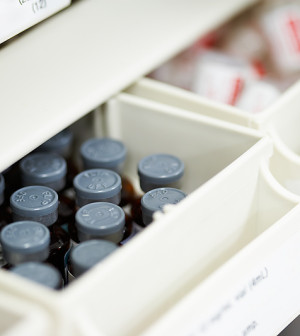- Double Mastectomy May Offer No Survival Benefit to Women With Breast Cancer
- Toxic Lead Found in Cinnamon Product, FDA Says
- Certain Abbott Blood Sugar Monitors May Give Incorrect Readings
- Athletes Can Expect High Ozone, Pollen Counts for Paris Olympics
- Fake Oxycontin Pills Widespread and Potentially Deadly: Report
- Shingles Vaccine Could Lower Dementia Risk
- Your Odds for Accidental Gun Death Rise Greatly in Certain States
- Kids From Poorer Families Less Likely to Survive Cancer
- Tough Workouts Won’t Trigger Cardiac Arrest in Folks With Long QT Syndrome
- At-Home Colon Cancer Test Can Save Lives
HIV-Positive Inmates Benefit From Drug Treatment, Study Says


Providing drug therapy to HIV-positive prison inmates helped a significant number of them achieve suppression of the virus before they were released, a new study finds.
HIV patients with so-called “viral suppression” are less likely to transmit the AIDS-causing virus to others, experts noted.
The study, published online March 31 in JAMA Internal Medicine, included 882 HIV-infected prisoners in Connecticut who were in jail for at least 90 days and were put on antiretroviral therapy (ART). Most of the prisoners were men, their average age was 43 and about half were black.
Nearly 30 percent of the inmates had viral suppression when they began their sentence, compared with 70 percent just before their release, the study found. Age, race, length of jail term, or type of antiretroviral regimen did not affect the likelihood of viral suppression, according to a journal news release.
“Treatment for HIV within prison is facilitated by a highly structured environment and, when combined with simple well-tolerated ART regimens, can result in viral suppression during incarceration,” said study author Dr. Jaimie Meyer, of Yale University School of Medicine, and colleagues.
But not every state has resources similar to those in Connecticut, another doctor pointed out.
“Unfortunately, the features of the excellent correctional care provided to HIV-infected persons in this Connecticut system are not available to all of the estimated 20,000 HIV-infected persons incarcerated in federal or state facilities,” Dr. Michael Puisis, a correctional consultant in Evanston, Ill., wrote in an accompanying commentary in the journal.
“While the Connecticut study is a positive accomplishment, HIV care in correctional centers still needs improvement in several areas,” he said. “We should take fullest advantage of the incarceration period, when people can receive supervised treatment, to improve their health and to develop discharge plans that will maintain these benefits on the outside.”
More information
The U.S. National Institute of Allergy and Infectious Diseases has more about HIV/AIDS.
Source: HealthDay
Copyright © 2024 HealthDay. All rights reserved.










